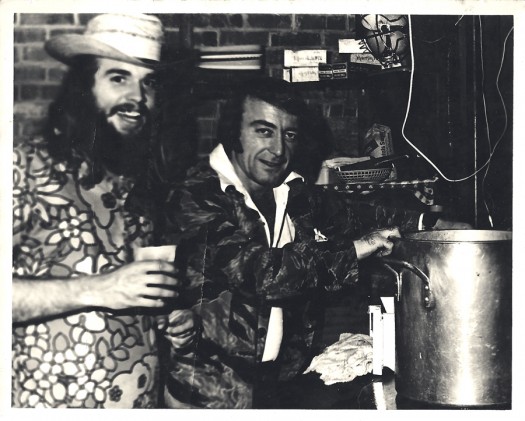A Placemaking Journal
Tea Party Taps Hippie Wisdom: How’s that working out?
So I’m sitting in one of those community meetings we’ve all become familiar with of late. A local Tea Party type is making a passionate pitch for what his group considers Constitutional guarantees against government planning, and I get this deju vu tug.
I’ve been here before. I’VE BEEN THIS BEFORE.
If you strip away the extraneous stuff — the firearm fetish, the rabbit hole excursions into U.N. plots, vaccine conspiracies, fluoride poisoning and all the rest — these guys are hippies. Their platform planks are bumper stickers from a 1972 VW van: “Do your own thing.” “Question authority.” “F*#$% the Man.”
I say this ‘cause I know from hippies. I was there. I inhaled. I had the hair, the in-your-face attitude and, most of all, the sense of entitlement.
Back in the ‘60s and ‘70s, we practically invented paranoia (see Hunter Thompson). But it took a lot of mushrooms to get us as worked up as your average Social Security, Medicare and mortgage-subsidized anti-establishment type today. Also, we had better music.
But when you get right down to it, it’s clear these folks picked up the torch that slipped from my generation’s grasp three or four decades back. They share the core belief, succinctly summarized: “Hey you, get off-a my cloud.”
Freedom, baby. Let your freak flag fly. (That would be the “Don’t tread on me” version.)
We said, in defiance of our likely futures, “Don’t trust anyone over 30.” The Tea Party hippies, in defiance of all known success in commerce, marriage and sky-diving, say, “Don’t trust anyone.”
There’s a whiff of political theory here, the periodically exhumed fantasy of a society of individuals defined by a determination not to be defined. Or inhibited. Or organized in any way that requires organization or responsibility to anything beyond the mighty Me. Every person doing his or her or its own thing. Back to the way God intended before all that trouble in the garden. (See Joni Mitchell, “Woodstock.”)
I would love to believe our hippie ethos allowed for more irony, but then I remember how we, like these new hippies, portrayed ourselves as victims of vast forces bent on enslaving us (see this relic of the era). Like the current crowd, we congratulated ourselves for spotting the plots and for heroically engaging the shadowy conspirators.
We persisted in that argument at the same time many of us lived and partied on subsidies from our parents and the Man. I don’t remember, at the time, being struck by the contradiction that I was splitting my time between anti-war protests and enjoying a George Bush-style arrangement with the Air Force Reserves.
Inspired by our victim fantasies, we chose the political strategies of the underdog: Disturb and disrupt. Block business as usual. Annoy the elites. Which is noble enough when the cause is civil rights or a challenge to justifications for war. Not so much when the perceived threat is the hierarchal organization of the English Department or, in the current era, transit policies and zoning.
How did all that turn out for my hippie comrades and me? Well, we definitely had an impact close to home. We successfully challenged some of the weakest elites in American life, university administrators, and won. Let’s hear it for no dorm curfews and veto power over commencement speakers.
It was a hell of a party. And a hangover that derailed the Democrats for a few election cycles. We helped generate a lot of profits for corporations who translated our lifestyle preferences into products they could sell back to us. And I’d like to think we nudged American society towards tolerance for dissent and diversity, just as the Tea Party, despite all its excesses, has forced us to admit we have to pay for stuff we charge to government credit cards.
But all that said, old hippie attitudes and fashions are now remembered mostly as generational distractions. Something we got away with till the grown-ups came back into the room. Until, in fact, WE became the grown-ups.
Parents, successful managers of businesses and non-profits, people who work to improve lives in neighborhoods and towns all know that “Do your own thing” is a lousy mission statement. Rather than freeing us, prioritizing individual liberty over every other value deprives us of opportunities to influence the forces of disruptive change with the power of community.
Polarizing discussion by declaring, “You’re either part of the solution, or you’re part of the problem,” ignores the range of trade-offs every human, every organization and every community must make every day. It’s a mandate for paralysis.
Now, it looks as if the new hippies may be trudging down the path to irrelevance, just as we did. Recent polls show a steady increase in the Tea Party’s “unfavorable” numbers and in the indifference of Americans to its message. The escalating battle between the GOP establishment and the Tea Party insurgents could scar the Republicans just as the ‘60s scarred Democrats.
The new hippies have successfully disrupted the work of some of the least powerful “elites” in American civic life — community planners. So strategies for transit, affordable housing, and mixed-use zoning have been blocked in some places that desperately need it — but not everywhere and not for long. Reality will win out. Grown-ups are on the way, probably in the form of Millennials disgusted by the current ways of doing the people’s business.
In the not so distant future, there will be hilarious theme parties where folks get to wear three-corner hats and wave copies of the Constitution with all references to government redacted. It won’t be as funny as bellbottoms, but it will celebrate the same spirit of time not so well wasted.
–Ben Brown
If PlaceShakers is our soapbox, our Facebook page is where we step down, grab a drink and enjoy a little conversation. Looking for a heads-up on the latest community-building news and perspective from around the web? Click through and “Like” us and we’ll keep you in the loop.







